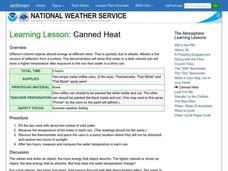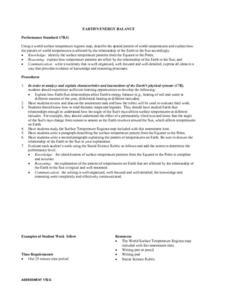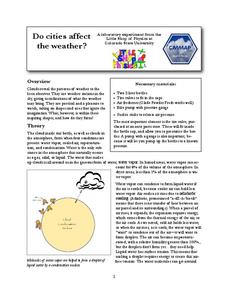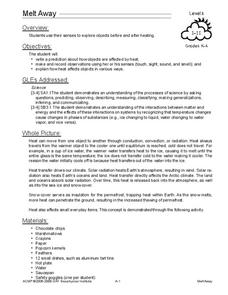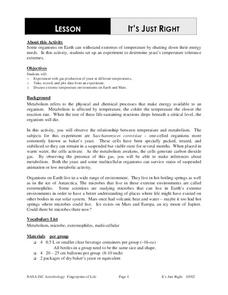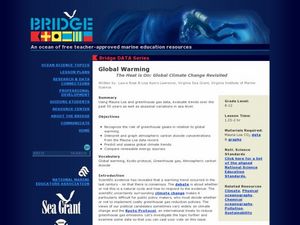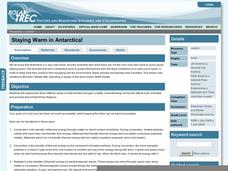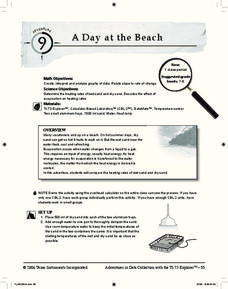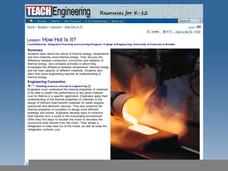Curated OER
How Do You Use Thermal Energy?
In this thermal energy worksheet, learners review radiation, convection, and conduction. This worksheet has 3 matching and 6 short answer questions.
Curated OER
Solar Collectors
Students explore solar collection. In this solar energy instructional activity, students use two circles of white and black construction paper at the bottom of containers of water to investigate solar collection. Students record the...
Curated OER
How Effective is Perspiration at Cooling?
Students collect data on the cooling of water in two different test tubes, one that is wrapped in wet newspaper and one in dry newspaper. They then relate this cooling effect to the body's perspiration.
Curated OER
Canned Heat
Learners demonstrate that light and dark colored objects absorb the sun's radiation at different rates. They experiment with the temperature change of water in two locations and discuss the results.
Curated OER
Warm Me Up!
Third graders explore and identify heat sources. They conduct an experiment involving thermometers and articles of clothing, and record and discuss the results.
Curated OER
Earth's Energy Balance Performance Standard
Students examine how Earth-Sun relationships affect Earth's energy balance and the pattern of world temperatures. Students study a Surface Temperature Regions map and write a paragraph describing the temperature pattern from the Equator...
Curated OER
What is Climate?
In this climate activity, students review the components that make up climate including temperature and precipitation. This activity has 8 true or false and 2 short answer questions.
Curated OER
The Energy Debate - Conclusion
Pupils write a persuasive essay about the choices in the energy debate. They comprehend the environmental consequences that accompany the decision. Students predict how they will power their future.
Colorado State University
Do Cities Affect the Weather? (Making a Cloud in a Bottle)
The dynamics of a city can have a drastic effect on the weather. A hands-on lesson asks learners to build a model to illustrate how city pollution provides a nucleus for condensation. The greater the pollution, the greater chance for...
Curated OER
Melt Away
Students explore objects before and after heating using their senses. In this matter and energy lesson, students experiment with a variety of objects and use their senses (except taste) to make predictions and record observations about...
Curated OER
Jackie Gore
Students identify the amount of heat given off by solar energy. In this solar energy lesson, students complete an experiment using soil and sand measuring the heat from solar energy.
Curated OER
The Webb Space Telescope: Detecting Dwarf Planets
In this detecting dwarf planets learning exercise, students read about the Webb Space Telescope that will be launched in 2014 to detect dwarf planets using an infrared telescope. Students solve 3 problems and create a graph for each...
Curated OER
It's Just Right
Young scholars conduct an experiment to determine the temperature tolerance of yeasts. In this biology lesson plan, students collect data and compare them by plotting graphs. They explain how extreme temperatures affect organisms.
Curated OER
Solar Water Heater Kit
For this earth science worksheet, students identify and experiment how hot water gets in a solar water heater. Then they respond to four short answer questions that follow related to the experiment.
Curated OER
Global Warming - The Heat is On: Global Climate Change Revisited
After listening to your lecture on climate change, young scientists access NOAA's database listing Mauna Loa's carbon dioxide data. They graph the monthly means and then compare their graphs to NOAA's. This is a concise plan that could...
Polar Trec
Staying Warm in Antarctica!
Has your class ever wondered how animals and scientists stay warm in the Polar Regions? Kids will investigate to understand the three types of heat transfer and how heat transfer affects those trying to stay toasty in sub-zero...
Teach Engineering
Capturing the Sun's Warmth
Passive solar heating is a technology that's been in use for thousands of years. Here, elementary schoolers are exposed to this type of heating, the materials that are used in passive solar heating, and they study how engineers design...
McAuliffe-Shepard Discovery Center
Global Warming in a Jar
This well-organized lab activity introduces earth science pupils to the greenhouse effect. They will set up two experiments to monitor temperatures in an open jar, a closed jar, and a closed jar containing water. Ideally, you would have...
American Association for the Advancement of Science
Sensing the Invisible: The Herschel Experiment
Learners of light will construct a contraption in which light is passed through a prism and shone into a box. The temperatures at different points along the path and outside of the path of light. The intent is to imitate William...
Curated OER
Global Warming Experiment
Students examine the changes in Earth's temperature. In this global warming lesson, students perform an experiment testing temperatures of soil. Students record their findings and discuss what made the differences in the soil temperature.
Curated OER
What Causes the Seasons?
Middle schoolers conduct experiment to examine how tilt of globe influences warming caused by lighted bulb. They monitor simulated warming of their city by sun in winter and in summer by using light bulb, interpret results, and submit...
Curated OER
Winter Insulation
Students test insulation materials. In this energy conservation lesson, students use different insulation materials to see which one holds heat the best. Students pour hot water into bottles, take the temperature, wait 15 minutes, then...
Curated OER
A Day at the Beach
Help learners determine the rate of change for the temperature of sand. They will collect data on the temperature of wet and dry sand over time with a heat lamp overhead. Then make a scatter plot of the data and find a linear model to...
Teach Engineering
How Hot is Hot?
Elementary schoolers identify the three methods of heat transfer: conduction, convection, and radiation. The instructional activity is mostly lecture-based. When the teacher has finished the presentation, groups of pupils get into teams...





